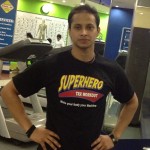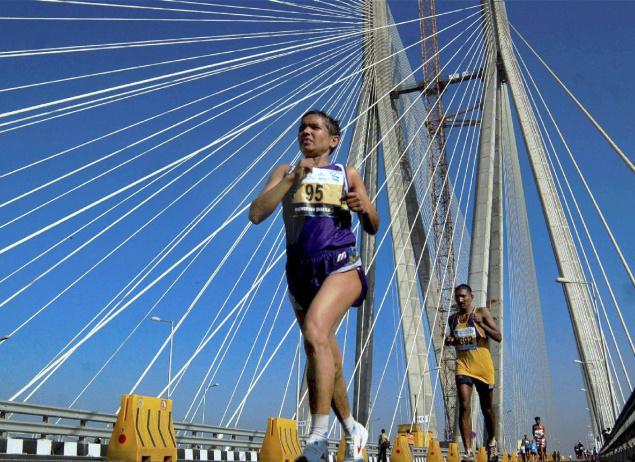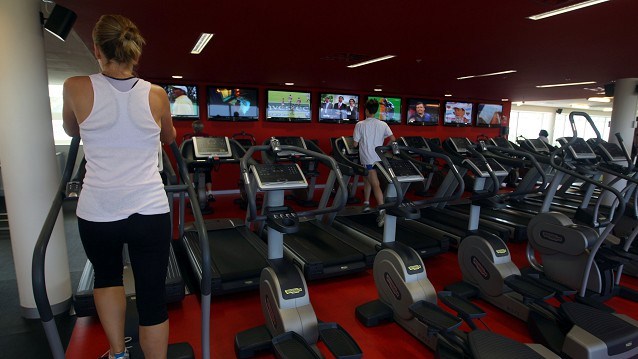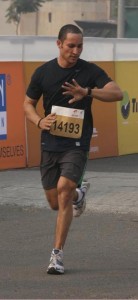A nutritionist explains what a marathoner’s diet just days before the race should be. Plus, diet tips for Marathon runners.
Part I of the ‘Mumbai Marathon’ diaries
 Ritesh Shaiwal is fitness manager and nutritionist at Fitness First, Mumbai. He has been consulting on nutrition and training for the last five years, and on a year-to-year basis, he has counselled close to 25 runners. Of these, four are participating in the Mumbai Marathon on January 20, 2013.
Ritesh Shaiwal is fitness manager and nutritionist at Fitness First, Mumbai. He has been consulting on nutrition and training for the last five years, and on a year-to-year basis, he has counselled close to 25 runners. Of these, four are participating in the Mumbai Marathon on January 20, 2013.
If you’re participating in the Marathon this Sunday, Ritesh’s tips on eating and drinking right will hold you in good stead.
What your diet should comprise of:
The diet for someone running the Full Marathon would be completely different from that of a Half Marathon runner. The percentage of complex carbohydrates in the diet of a Full Marathon participant would be at least 30 per cent higher than that of a Half Marathon runner, as he/she would require more energy to complete a 42 kilometre run. The diet for both categories would change every four to six weeks if one has to design a one-month nutrition plan. Complex carbs would increase by five to eight per cent every week, with not too many changes in the percentage of protein and fat consumed.
What to eat while training:
Primarily, the foods that are good to go are whole wheat bread, brown rice, whole wheat pasta, vegetables and salads as mid-meals, plus for dinner, along with a dry fruit meal, peanut butter plus chicken/fish/mutton/tofu/soy will get you all the protein nutrition you require. And last but not the least, a regular intake of fruit will help pace your run as well as your training routine.
What to eat till the race:
The diet, say one week before the race, would be: Carbs (50 per cent), Protein (35 per cent) and Fat (15 per cent) where one should consume complex carbs for breakfast and lunch. A week before the run, one should change the carbohydrates percentage from 50 per cent to 60 per cent, and include complex carbs for dinner. A night before the race, have a good heavy complex carb meal of pasta and chicken because you need the energy for the race the next day.
On race day:
On the morning of the race, two bananas with a slice of peanut butter sandwich does the trick for me. During the race, ensure that you have Electral or Gatorade, as your body requires the nutrition to sustain a long run. Post the race, you can go back to a normal, balanced diet.
Opt for these slow energy foods:
Slow energy foods are basically complex carbohydrates. The best sources for these are oats, whole wheat bread, brown rice, whole wheat grain roti and whole wheat pasta. Whole wheat pasta is my personal favourite complex carb, along with chicken, on the night before the race.
Avoid:
Aerated drinks and chocolates while you are training, as also chips and cookies. These are high in unsaturated fat.
The deal with energy drinks:
Energy drinks are great while training and during the run, as they contain simple carbohydrates which provide instant energy to the body, as compared to complex carbs. So having an energy drink while training or running is important so that your body does not go into starvation mode and gets instant energy. But be sure to only sip on the drink, don’t gulp it in large quantities.
Hydration on the go:
Hydration is key when you are running a long distance. For every kilometre or 1.5 km, one should sip about 100 ml of water, so that your energy levels are up and about. Once you are in the run for, say 45 minutes to 60 minutes, energy drinks should be introduced as a part of the hydration programme, apart from water. Keep sipping while you are on the run – don’t stop to sip as it will affect your timing.
Diaries is a series of stories on one theme. The Mumbai Marathon diaries aim to lay the ground for the actual event on Sunday, January 20, 2013. Watch out for Part II tomorrow, where we speak with a trainer on exercising for the Marathon.
(Featured image tumblr.com)
 Though I’ve maintained an active lifestyle, I started training specifically for the Mumbai Marathon about four months ago. I trained both outdoors and in the gym.
Though I’ve maintained an active lifestyle, I started training specifically for the Mumbai Marathon about four months ago. I trained both outdoors and in the gym.



